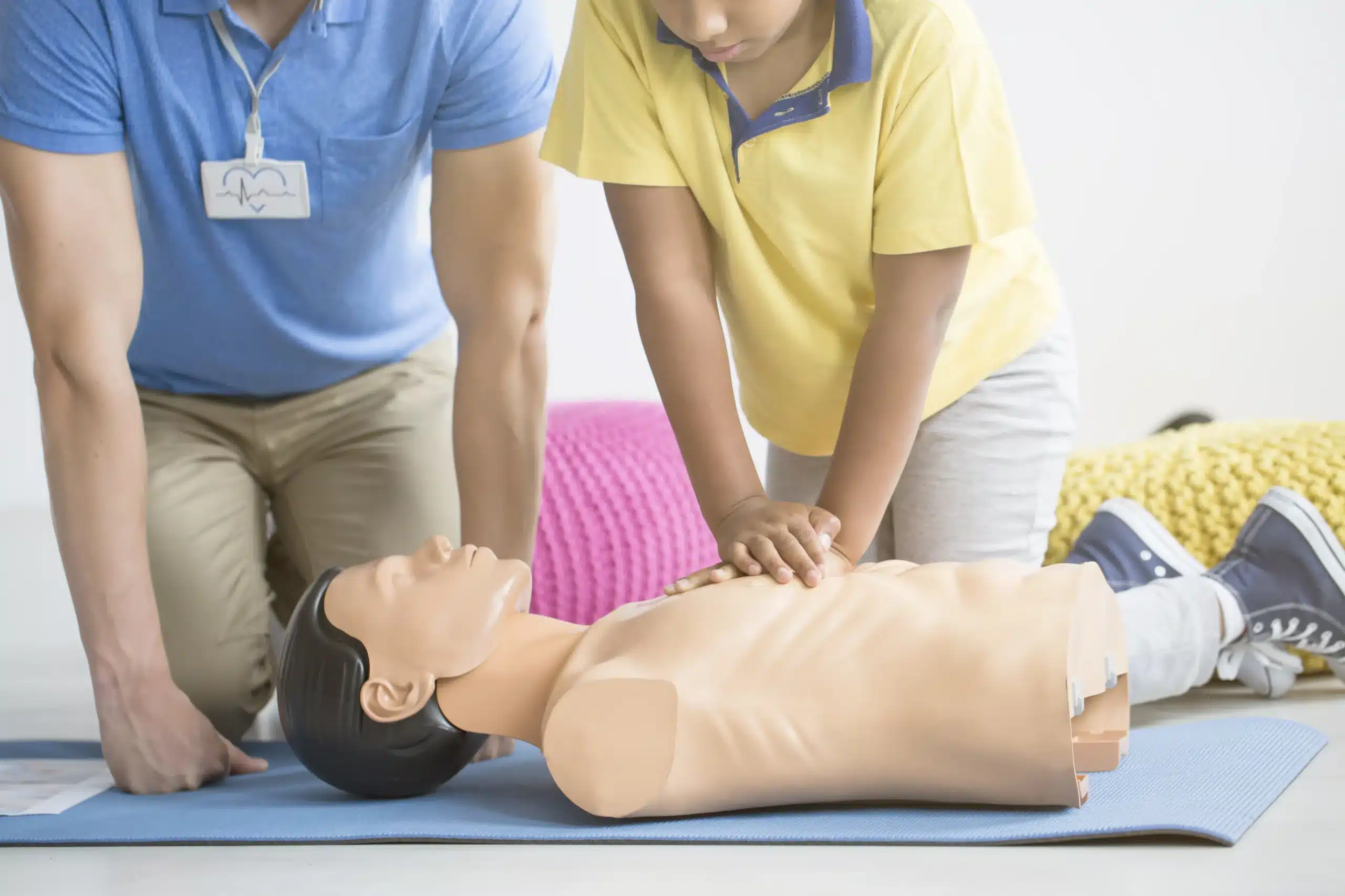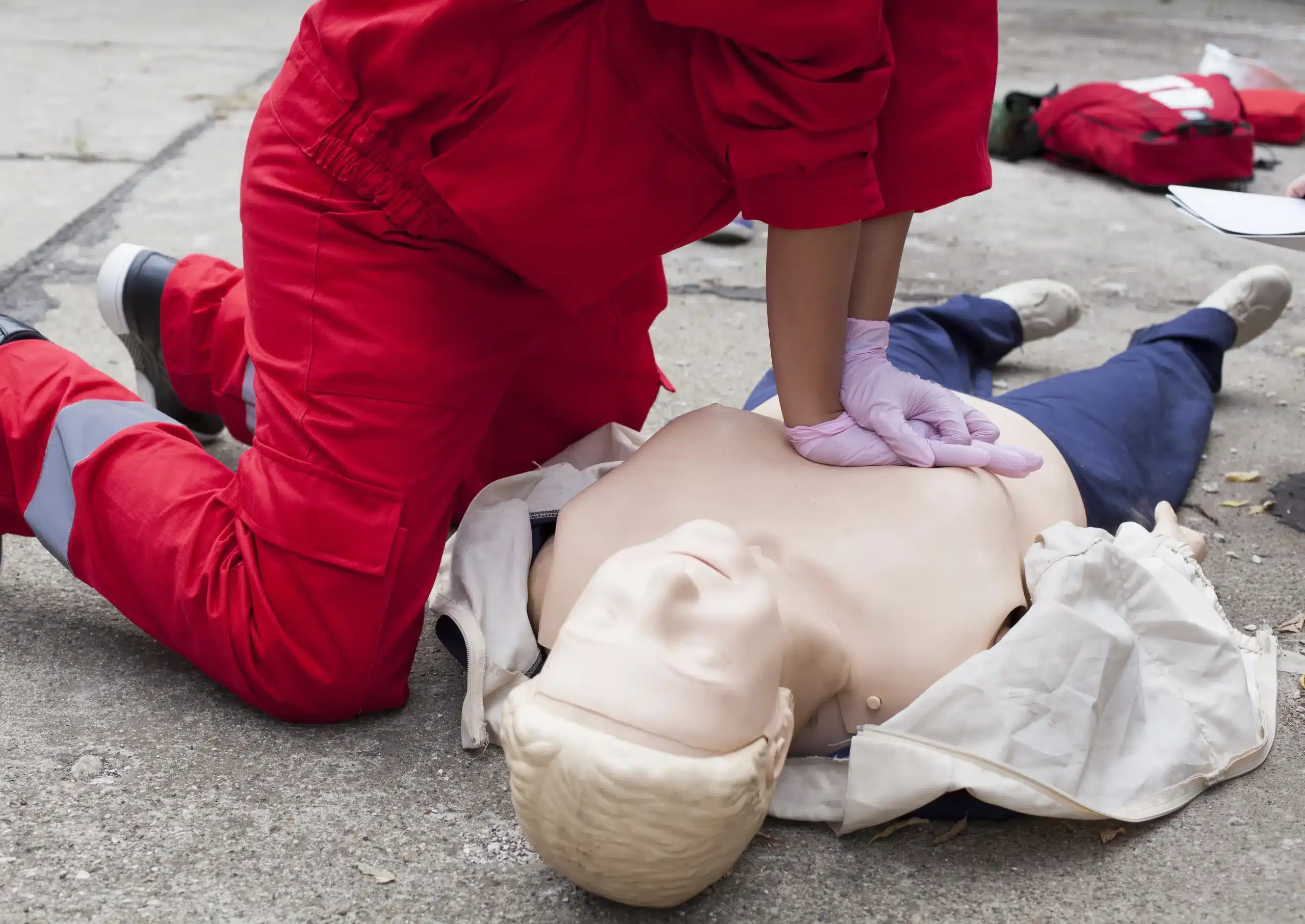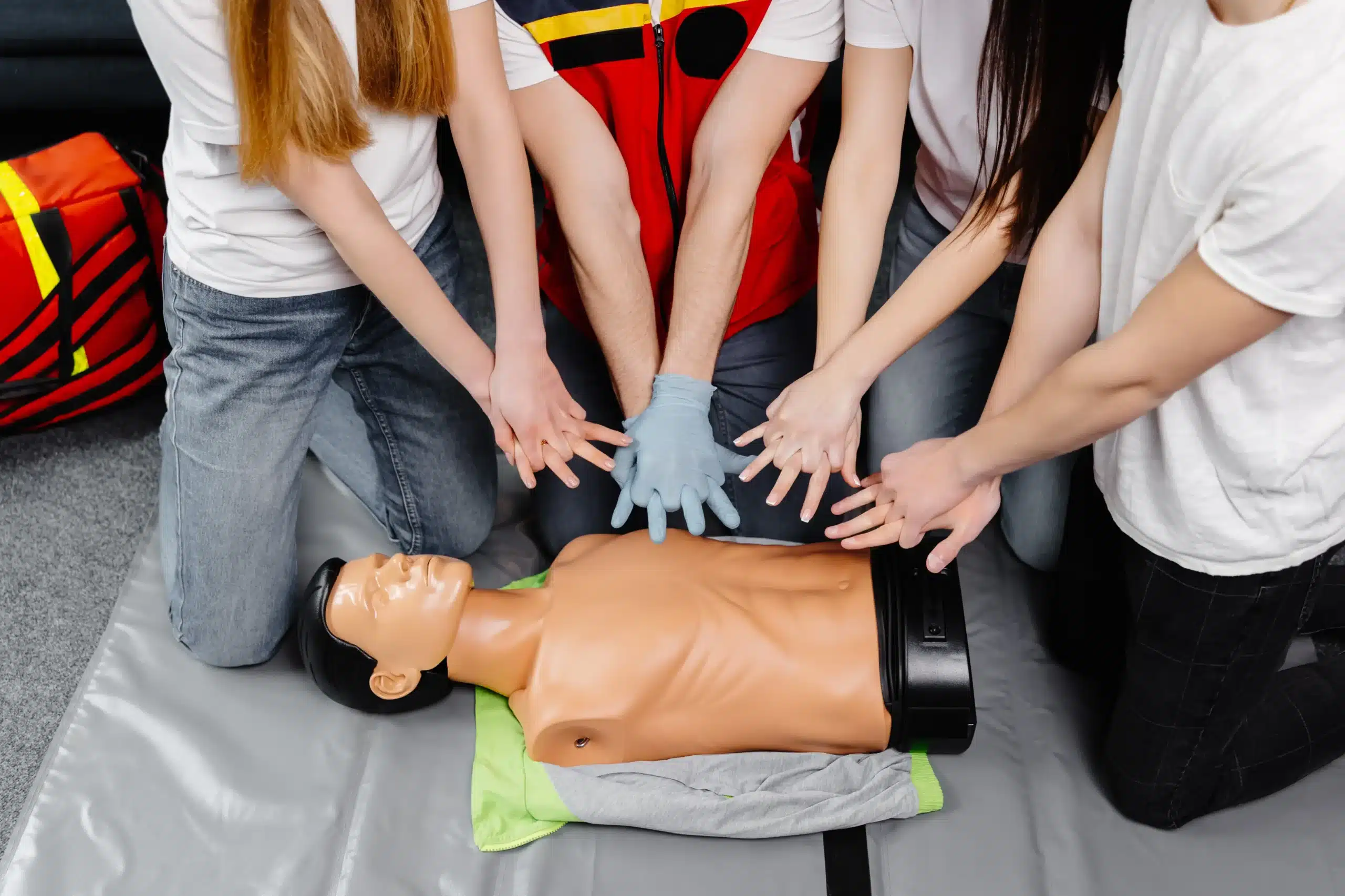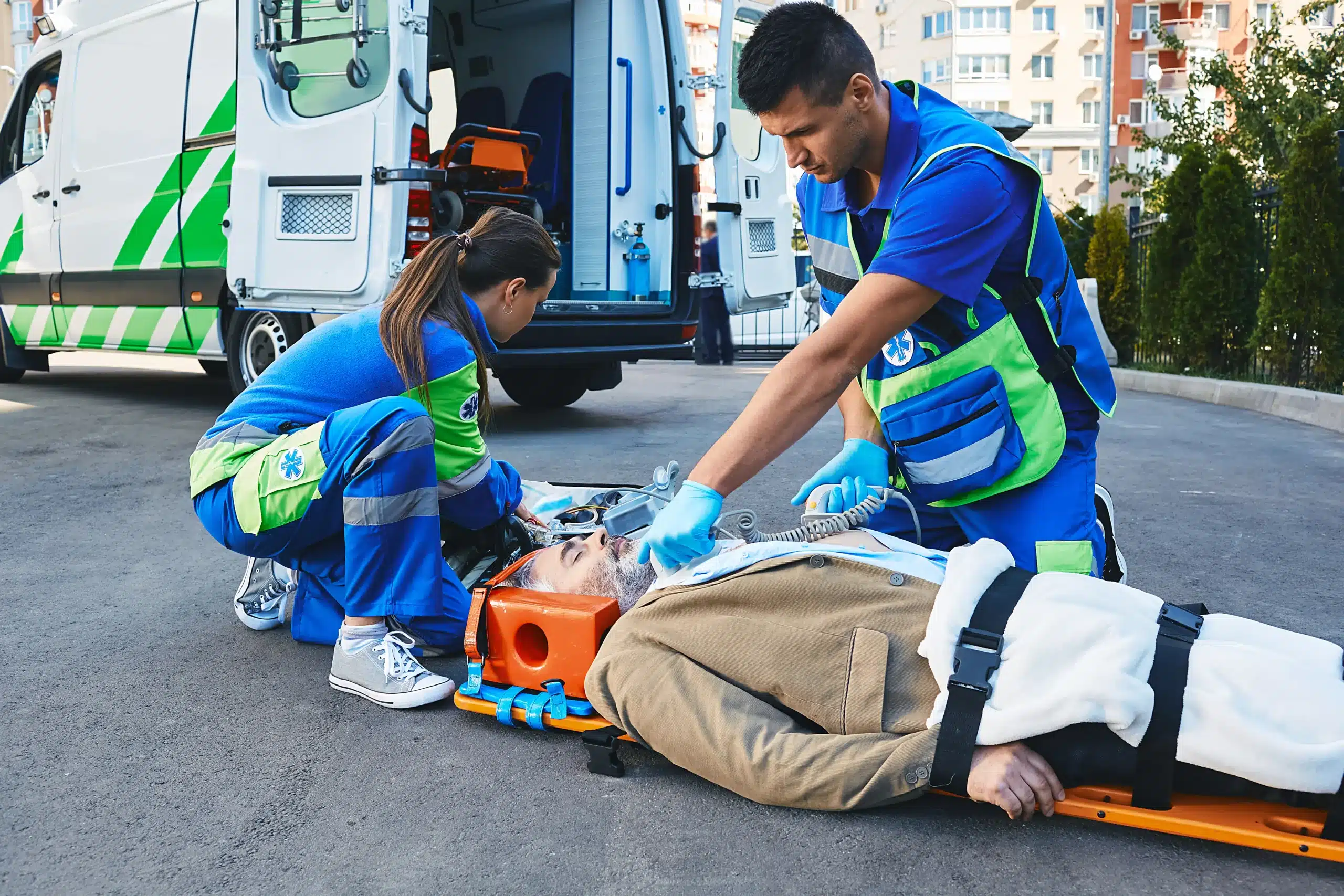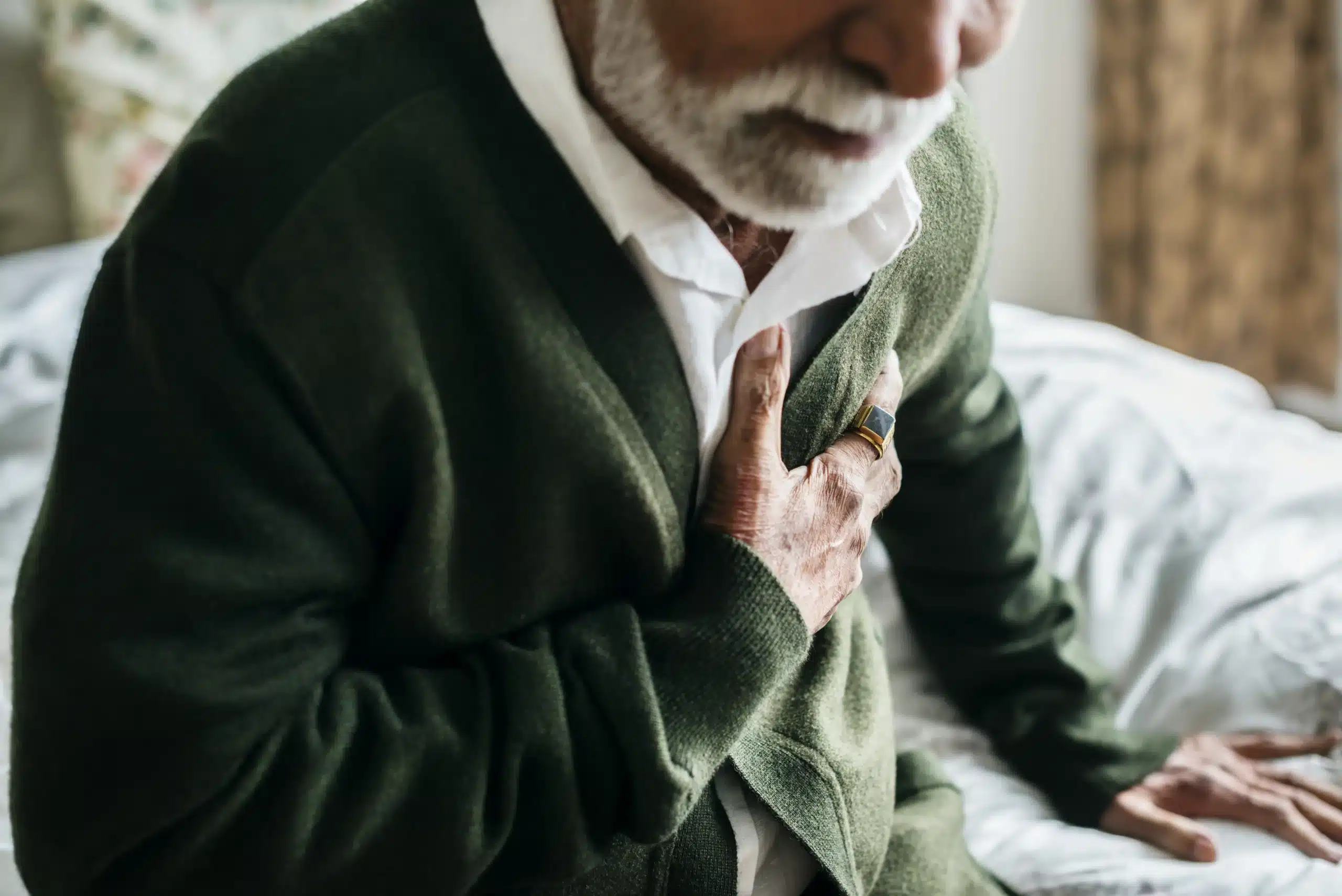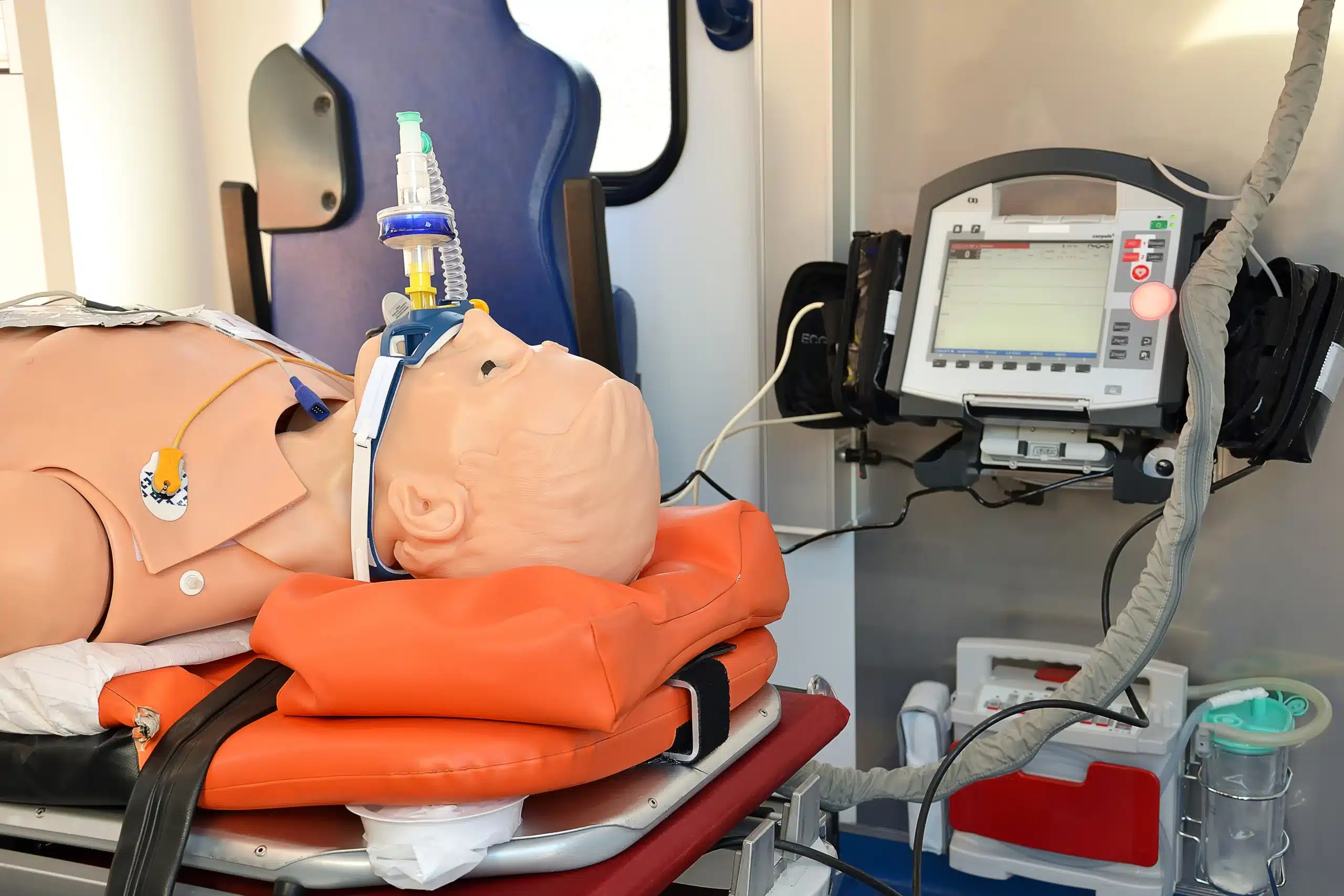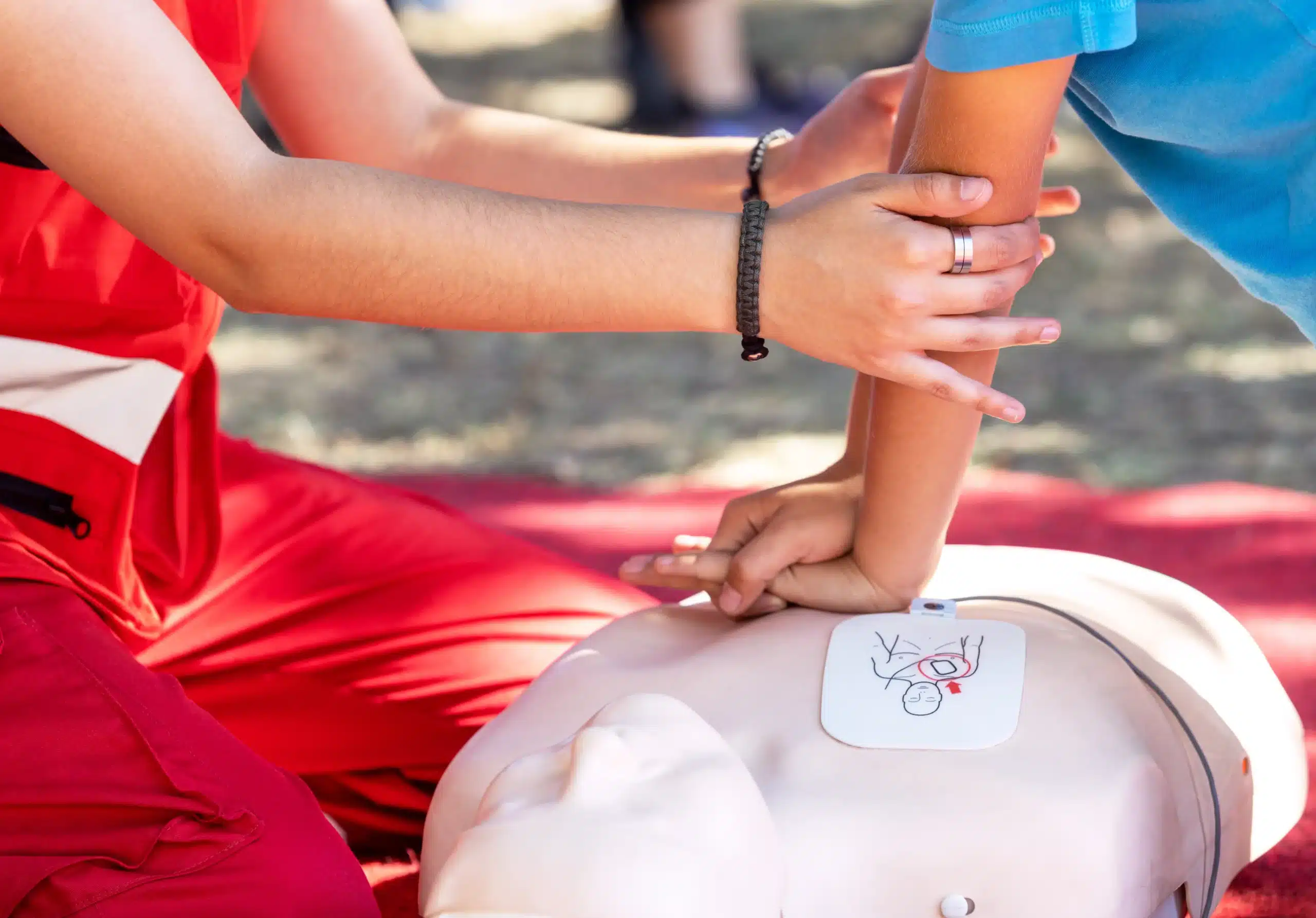Medical emergencies can happen anytime, anywhere. Being prepared is not just a good idea—it’s potentially life-saving. CPR certification courses in Tracy provide the knowledge and hands-on training to respond effectively in such situations. This comprehensive guide explores the various CPR certification options available in Tracy, including BLS, ACLS, PALS, and First Aid. We’ll also discuss the benefits of certification, what to expect during training, how to choose the right course for your needs, and how to maintain your certification. Empower yourself to make a difference.
Key Takeaways
- CPR certification offers various levels to match your needs: From basic CPR/AED for the public to advanced certifications like BLS, ACLS, and PALS for healthcare providers, find the course that aligns with your personal or professional goals. Consider adding First Aid training to enhance your skill set.
- Flexible learning options make CPR training accessible: Choose from in-person classes, blended learning (online and in-person instruction), or on-site group training. Many providers offer evening and weekend classes. Explore programs like RQI for a convenient, self-paced online learning experience combined with a short in-person skills session.
- CPR certification is a valuable personal and professional asset: Whether you work in healthcare, childcare, fitness, or simply want to be prepared, CPR training empowers you to respond effectively in emergencies. It strengthens your resume and, most importantly, equips you with life-saving skills.
What is CPR Certification?
CPR certification confirms your ability to perform cardiopulmonary resuscitation (CPR) and other life-saving techniques during emergencies. It’s essential for healthcare providers, first responders, and anyone prepared to help in a crisis. The American Heart Association (AHA) offers various CPR certification courses, including Basic Life Support (BLS) for healthcare providers and Heartsaver courses for the general public. These courses equip you with the knowledge and skills to respond effectively when seconds count. The training typically covers chest compressions, rescue breathing, and using an automated external defibrillator (AED). CPR certification is often required for certain jobs, especially in healthcare and childcare. Beyond these fields, having this certification increases your employability in other areas, including education and emergency services. It’s valuable whether you’re pursuing a specific career or want to protect yourself and your community.
CPR Certification Courses in Tracy
CPR certification equips you with the skills to respond to medical emergencies. Various levels of certification cater to different needs and professions. Here’s a breakdown of the CPR courses available in Tracy:
Adult, Child, and Infant CPR
This fundamental course covers the essential techniques for performing CPR on adults, children, and infants. You’ll learn how to recognize the signs of a cardiac arrest, perform chest compressions, and provide rescue breaths. Many training centers, like Safety Training Seminars, offer combined CPR and First Aid classes, allowing you to develop both skill sets efficiently. This prepares you for a wider range of emergency situations.
Basic Life Support (BLS)
BLS certification builds upon basic CPR, covering the use of an automated external defibrillator (AED) and other airway management techniques. It’s designed for healthcare providers and other professionals who may respond to emergencies in a medical setting. Tracy CPR training centers often provide flexible scheduling, including evening and weekend classes, private and on-site training, and online or blended learning formats.
Advanced Cardiovascular Life Support (ACLS)
ACLS certification is a specialized course for healthcare professionals who manage patients during cardiovascular emergencies. It covers advanced life-saving procedures, including ECG interpretation, drug administration, and team dynamics during resuscitation. Training centers in Tracy frequently offer ACLS alongside other AHA courses like BLS, PALS, and CPR/First Aid.
Pediatric Advanced Life Support (PALS)
PALS certification focuses on the skills needed to respond to pediatric emergencies. It covers pediatric assessment, airway management, and resuscitation techniques for infants and children. Like other AHA certifications, PALS pricing varies depending on the training format (in-person, online, or blended).
First Aid Certification
While not strictly CPR, First Aid certification complements CPR training. It teaches you how to manage injuries, control bleeding, and handle other medical situations. Many providers in Tracy offer combined CPR and First Aid classes. These courses cater to various needs, from basic life support for everyday people to specialized certifications for healthcare professionals.
Course Features and Benefits
Tracy CPR Classes offers a range of courses designed to equip you with the skills you need, whether you’re a healthcare professional or simply want to be prepared for everyday emergencies. Here’s a closer look at what each course offers:
CPR Course Skills
Our CPR courses cover essential life-saving techniques, including adult, child, and infant CPR, AED training, and how to recognize the signs of a heart attack or stroke. You’ll learn how to assess a situation, perform chest compressions and rescue breaths, and provide basic life support until professional help arrives. We also offer First Aid certification, covering common injuries and illnesses like burns, cuts, and allergic reactions. Combining CPR and First Aid training gives you a well-rounded skill set to handle a variety of emergencies.
Duration and Certification Validity
Course durations vary depending on the content covered. Our BLS course for healthcare providers is more comprehensive than a basic CPR/AED course and requires more time. All our certifications are valid for two years, in line with American Heart Association guidelines. Visit our website for specific course lengths and pricing details for CPR/AED, BLS, ACLS, and PALS certifications.
Prerequisites for Advanced Courses
Some advanced courses, like ACLS and PALS, have prerequisites. You’ll typically need a current BLS for Healthcare Providers certification before enrolling in these advanced courses. This ensures you have a solid foundation in basic life support techniques before moving on to more specialized training. Our course directory clearly outlines any prerequisites.
Flexible Learning Options
We understand busy schedules can make it tough to fit in training. We offer flexible learning options, including in-person classes, blended learning (a combination of online and in-person instruction), and on-site training for groups. We also offer evening and weekend classes to accommodate various schedules and learning preferences. Whether you prefer a traditional classroom or the convenience of online modules, we have a format that works for you.
What to Expect in Your CPR Course
Getting CPR certified is a rewarding experience, and knowing what to expect can make you feel more prepared. From the classroom setting to the hands-on practice, here’s a glimpse into your upcoming CPR course.
Classroom vs. Hands-On Training
CPR courses blend classroom learning with hands-on practice. Expect a combination of lectures, discussions, and demonstrations covering essential concepts like recognizing cardiac arrest, providing high-quality chest compressions, and delivering rescue breaths. Many CPR training providers in Tracy offer evening and weekend classes to accommodate busy schedules. For a flexible option, Tracy CPR Classes offers the RQI program, a blended learning course that lets you complete the cognitive portion online at your own pace before scheduling a short skills session and test.
Assessment and Certification
Your CPR course will include assessments to evaluate your understanding and practical skills. You’ll typically demonstrate your CPR technique on a manikin, showcasing your ability to perform chest compressions, rescue breaths, and use an AED (Automated External Defibrillator). Upon successful completion, you’ll receive certification from a recognized organization like the American Heart Association. These certifications are usually valid for two years, after which you’ll need to renew. Safety Training Seminars, located in Tracy, offers AHA-certified courses and emphasizes community safety with convenient training options.
Required Materials and Preparation
Most CPR courses don’t require extensive preparation. Your provider will supply the necessary materials, including manikins and AED trainers. Comfortable clothing is recommended for the hands-on portions of the course. Some training centers offer combined CPR and First Aid courses, allowing you to learn both sets of skills efficiently. Check with local providers like Tracy CPR Classes, Safety Training Seminars, or Bay Area CPR to compare course offerings, schedules, and teaching formats to find the best fit for you. Consider factors like class size and instructor experience when making your decision.
CPR Certification: Pricing and Registration
Getting CPR certified is an investment in yourself and your community. Understanding the costs, available discounts, and registration process makes it easier to prepare.
Course Costs
CPR certification costs vary based on several factors. The type of course you choose—such as CPR/AED, Basic Life Support (BLS), Advanced Cardiovascular Life Support (ACLS), or Pediatric Advanced Life Support (PALS)—will influence the price. In-person classes, online courses, and blended learning options often have different price points.
Discounts and Promotions
Many training centers offer discounts, so keep an eye out for special offers. Some providers have discounts for groups, students, or returning customers. Ask about potential promotions when you inquire about a course.
Registering Online
Registering for your CPR class is usually straightforward. Many providers, including Tracy CPR Classes, allow online registration. For example, the RQI program, a blended learning course, lets you complete the cognitive portion online at your own speed. You can then schedule a short in-person skills session and exam.
Class Schedules
CPR training centers in Tracy understand that people have busy schedules. Most offer flexible scheduling options, including evening and weekend classes. You can often find private, on-site training, as well as online or blended learning formats. Check with your chosen provider to find a class time that works for you.
Who Needs CPR Certification?
CPR certification equips individuals with life-saving skills, but some professions benefit significantly more. Let’s explore who needs this crucial training:
Healthcare Professionals
Healthcare providers, including doctors, nurses, medical assistants, and EMTs, frequently encounter situations requiring immediate medical intervention. CPR certification is often mandatory for these roles, ensuring they can respond effectively to cardiac arrest and other emergencies. This provides essential care until more advanced medical help arrives. For those in Tracy, CPR training is readily available.
Childcare Providers and Educators
Working with children means ensuring their safety and well-being. For childcare providers, teachers, and camp counselors, CPR certification is invaluable. It allows them to respond swiftly to choking incidents, near-drowning experiences, or other unexpected events that could compromise a child’s breathing. Specialized courses like EMSA Pediatric CPR & First Aid cater specifically to the needs of childcare professionals in California.
Fitness Instructors and Coaches
Fitness professionals guide individuals through physical activities, sometimes pushing them to their limits. In such environments, the risk of sudden cardiac events can increase. CPR-certified fitness instructors and coaches can provide immediate assistance if a client experiences a heart-related emergency during a workout. The RQI program, a blended learning course, offers a convenient way for busy fitness professionals in Tracy to obtain and maintain their certification.
Emergency Responders
First responders, such as firefighters, police officers, and lifeguards, are often the first to arrive at the scene of an accident or medical crisis. CPR certification is a fundamental requirement, allowing them to administer life-saving aid while waiting for paramedics or other medical personnel. Comprehensive AHA courses in Tracy ensure that emergency responders have the skills and knowledge to handle various emergency situations.
Maintaining Your CPR Certification
Once you’ve earned your CPR certification, staying current with the latest guidelines and techniques is essential. This ensures you’re prepared to respond effectively in an emergency and demonstrates your commitment to providing high-quality care. Here’s how to maintain your certification:
Renewing Your Certification
CPR certifications, like those offered by the American Heart Association, are typically valid for two years. Before your certification expires, you’ll need to take a renewal course. This refresher covers any updates to CPR guidelines and allows you to practice your skills. Safety Training Seminars offers renewal courses for certifications like BLS, ACLS, and PALS in Tracy. Course costs vary based on the type of certification and your chosen learning format (in-person, online, or blended). For healthcare professionals, the RQI program offers a flexible, blended learning approach for BLS, ACLS, and PALS recertification.
Continuing Education
Beyond renewing your core certification, consider expanding your knowledge and skills through continuing education. This might include specialized courses like the EMSA Child Care Health & Safety program for childcare providers. Staying informed about advancements in emergency care ensures you’re equipped to handle various situations. Explore additional resources, like the Northern CA CPR Directory, to find other relevant courses and training opportunities. Many CPR training providers offer discounts and promotions, so check with providers like Safety Training Seminars for deals on AHA-certified courses. Tracy CPR Classes also offers the convenient RQI program, allowing you to complete the cognitive portion online at your own pace and then schedule a brief skills session and test.
Choosing a CPR Provider in Tracy
Finding the right CPR class can feel overwhelming, but focusing on a few key factors makes the process easier. Here’s what to consider when selecting a CPR provider in Tracy:
Accreditation and Recognition
First, confirm your chosen provider is accredited by a recognized organization like the American Heart Association (AHA). AHA-certified courses adhere to rigorous standards, ensuring you receive high-quality training and a certification recognized by employers and licensing boards. Many centers in Tracy offer AHA-accredited courses in BLS, ACLS, PALS, and CPR/First Aid. This accreditation gives you confidence you’re learning the most up-to-date, evidence-based practices. For example, Stockton CPR classes offer a range of AHA-certified courses.
Instructor Qualifications
Look for courses taught by experienced, AHA-certified instructors. Their expertise creates a better learning experience, giving you the confidence to apply your skills effectively. Qualified instructors can also answer your questions thoroughly and provide personalized feedback. Tracy CPR Classes are often led by instructors with extensive backgrounds in healthcare and emergency response.
Facility and Equipment
A positive learning environment includes a well-equipped facility. Modern equipment and a comfortable setting can significantly improve your learning experience. Consider providers like Safety Training Seminars, a woman-owned AHA Training Center in Tracy known for its high-quality courses and modern training equipment. A well-maintained facility demonstrates a commitment to providing a valuable learning experience.
Top CPR Providers in Tracy
Finding the right CPR training provider is crucial for a positive and effective learning experience. Here are a few reputable options in Tracy:
Tracy CPR Classes
Tracy CPR Classes offers a wide range of American Heart Association (AHA) courses, including BLS, ACLS, PALS, CPR, and First Aid. They also offer specialized training like the EMSA Child Care Health & Safety program and convenient RQI courses for healthcare professionals. The RQI program, in particular, offers a blended learning format where you complete the cognitive portion online at your own pace and then schedule a short skills session and test. All courses are taught by experienced, AHA-certified instructors.
Safety Training Seminars
Safety Training Seminars, located in Tracy, provides AHA-certified courses in BLS, ACLS, PALS, CPR, and First Aid. They focus on community safety and offer convenient training options.
American Red Cross
The American Red Cross offers various CPR training and certification classes in Tracy. With options for in-person, online, and blended learning, they provide flexibility for different schedules and learning preferences.
Bay Area CPR
Bay Area CPR offers comprehensive CPR training and certification, adhering to AHA standards. They prioritize delivering effective training to equip participants with lifesaving skills.
Participant Experiences and Outcomes
After completing a CPR certification course, especially one that combines CPR and First Aid training, you’ll feel more confident in your skills. Participants often report feeling better prepared to handle emergencies. This increased confidence is key, allowing you to react quickly and effectively under pressure. Knowing you can provide immediate assistance can truly make a difference. The ability to perform both CPR and First Aid efficiently also makes you a valuable resource in any environment.
Tracy CPR Classes offers the RQI program, a blended learning course where you complete the cognitive portion online at your own speed. Then, you schedule a short, in-person skills session and test. This flexibility works well for busy schedules and different learning styles.
Professional Development Benefits
CPR certification is a valuable asset for professional growth. Training centers in Tracy offer a range of American Heart Association courses, including BLS, ACLS, and PALS, ensuring access to high-quality, accredited training. These certifications show your commitment to safety and preparedness, strengthening your resume. For healthcare providers, these certifications are often required and essential for career advancement. Safety Training Seminars offers several American Heart Association-certified courses.
Course costs vary depending on the provider, the type of course (CPR/AED, BLS, ACLS, or PALS), and the format (in-person, online, or blended). Many CPR training providers offer discounts and promotions, making these valuable courses more affordable. Look for these opportunities to gain essential skills without overspending. Earning your CPR certification is an investment in your career and the safety of your community.
Related Articles
- Why CPR is More Important Than Ever
- CPR Courses Near Me: Your Guide to Lifesaving Skills – Tracy CPR Classes
- CPR Training in Tracy: Your Complete Guide – Tracy CPR Classes
- Find First-Aid Classes Near Me: Your Certification Guide – Tracy CPR Classes
- CPR Renewal in Tracy: Your Complete Guide – Tracy CPR Classes
Frequently Asked Questions
How long is CPR certification valid? CPR certifications are typically valid for two years. It’s essential to renew your certification before it expires to maintain your skills and ensure you’re up-to-date with the latest guidelines.
What’s the difference between BLS and CPR certification? CPR is the core skill within Basic Life Support (BLS). BLS certification encompasses CPR but also includes other skills like using an AED and managing airways. BLS is generally geared towards healthcare providers, while CPR/AED certification is suitable for anyone.
What if I have a busy schedule? Are there flexible class options? Yes, many CPR training centers offer flexible schedules, including evening and weekend classes, online courses, and blended learning (a mix of online and in-person instruction). Some providers also offer on-site training for groups.
How much does CPR certification cost? The cost varies depending on the type of course (CPR/AED, BLS, ACLS, PALS), the training format (in-person, online, blended), and the specific provider. Check with different providers in your area for pricing details and any available discounts.
What should I expect during a CPR class? CPR classes combine classroom instruction with hands-on practice. You’ll learn the theory behind CPR and other life-saving techniques and practice those skills on manikins. You’ll also be assessed on your performance to ensure you’ve mastered the techniques.
